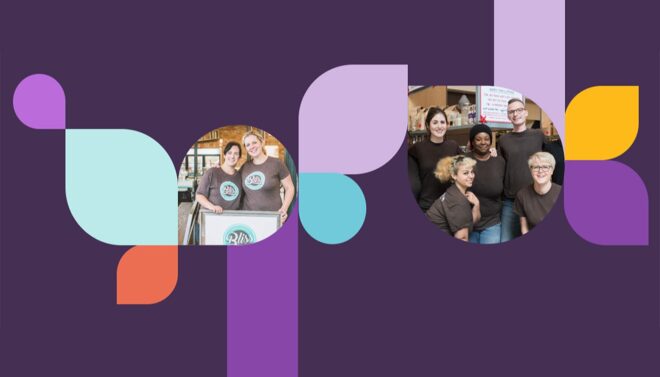Inside ‘Shark Tank’ investment-winning company CoinOut [interview]
Editorial Team
11 min read
Financial technology company CoinOut launched in 2016 as a small business app in the Clover App Market. The company took advantage of Clover’s reach among small businesses to quickly get their innovative product to market. CEO Jeff Witten and team soon realized they could build a smart customer communication and loyalty capability into CoinOut based on consumers’ and merchants’ real-world interactions with the technology.
Millions of viewers were introduced to CoinOut during its star turn on ABC’s Shark Tank, which aired on President’s Day weekend. Jeff’s convincing pitch earned the company a $250,000 investment for 15 percent equity from Robert Herjavec. We spoke with Jeff about how he and his team formed their pitch in preparation for a high-stakes, high-visibility moment; why Clover was such an integral partner in helping their company launch and continue to scale; and how CoinOut is bridging a chasm between cash transactions and digital payments.

Andaiye Taylor: How did CoinOut’s appearance on Shark Tank come to be?
Jeffrey Witten: We were [already] thinking about ways that we could grow the business when we were contacted by a producer on the show following a press piece on us in Fast Company in the fall of 2016. They say that they get something like 40,000 applications a year, and they accept only a handful, so the odds are pretty low. Going in, we thought we had a decent shot, but I wasn’t by any means expecting we’d get through. After several months we found out the good news, and we were super excited.
Andaiye: When you guys were preparing your pitch, what were the two or three things about CoinOut that you absolutely wanted to convey to the Sharks?
Jeff: I think for us, the big issue that we needed to communicate was that other than just payments and thinking about cash, the big opportunity was for large and small merchants to take advantage of digital tools for customers that aren’t on a smartphone app or aren’t using a retail or loyalty app.
In the payment space, the percentage of people that are actually doing online transactions in-store is low. Even Starbucks, which is the most successful, only captures 30 percent of their transactions as a digital stamp on the customer. For us that is a massive opportunity. We had to communicate that opportunity in a way that people who aren’t payment experts could understand.
And the second objective was to talk about the massive customer problem and issues around dealing with cash. The anecdotal evidence that I think is really persuasive is the fact that Coinstar, which does coin conversion, is a $3 billion-a-year business. They’re taking a fee for simply saying, “We’re going to take your money and we’re going to convert it into usable money.”
[Dealing with cash] was something that was inherently disconnected from a payment experience that should be really good, where the customer is feeling great about their interaction with a merchant, particularly in local business, where customers are visiting every day or couple of days.Andaiye: When you’re talking about CoinOut and what its prospects look like, how does your integration with Clover factor in?
Jeff: I think Clover was extremely important for us, and still is extremely important for us, because it was the one place where we could build a fully integrated solution in a cost-effective way, that let us actually put something in the field and get real feedback on it.
Clover is clearly unique in the way they set up the Clover App Market. The fact that they have growing distribution where, for a small startup, you can build something, put it out there, and then iterate and get feedback as people are using it. Clover was extremely important. It was really our first legitimate deployment.
Moving forward, it means distribution for us. Part of our pitch is the fact that the industry is growing and moving towards technologies like Clover that are fully integrated, and give tools directly to the local merchant that are not the old way of doing things–the old massive POS that costs thousands and thousands of dollars.
Andaiye: Outside of actually preparing your pitch, how else did you prepare for your appearance? Did you watch old videos like people do when they’re preparing for a sports contest?
Jeff: We took at least a month of full preparation. If you ever watch the show, you know the standard questions you’re going to get. And then when you reflect on your business, you know where you’re vulnerable and where they’re going to pry.
So we spent a ton of time rehearsing and coming up with a real story for why we’ve done what we’ve done, and I think Clover ties in nicely to that story. But really, it was being true to what we’ve built so far, what the mission is, and trying to evangelize the fact that the industry is moving in this direction, and there’s great momentum behind it.
Andaiye: What can you tell me about your experience taping Shark Tank and what it was like to be actually on the set and filming?
Jeff: I can say how I felt while I was on the set. When you look at the show, in many cases it’s make or break [for the companies that are pitching]. It wasn’t make or break for us, but we had to figure out a way to get really focused to make sure we were conveying what we wanted to convey, because we only had one shot.
Were there nerves? Certainly. But I think with any sort of big shot, the adrenaline kicks in and takes over. I think that the stage and the nerves just sort of pumped in, and all of that additional adrenaline helped get me focused.
Andaiye: Were you already a fan of the show when you started preparing?
Jeff: I was a big fan; I’ve always been a big fan. I think it’s been part of the reason I got into entrepreneurship, as I think it is with a lot of people in the country. You hear the stories about small businesses and see how well they do. I think it’s also become a lot easier to start businesses with the decreasing cost of software. The show has had a big impact on my journey.
Andaiye: You graduated from Columbia University with dual business and law degrees. Did the idea for CoinOut come to you during that experience?
Jeff: Yes. When I was a first-year law student I was on track to become a standard corporate lawyer, and I decided I didn’t want to go down that path.
I ended up doing the joint business degree, and had the opportunity after my first year of law school to go work at Apple. And while I was there I got involved in payment technology. We were looking at broader trends in the smartphone market, and one of those trends was prepaid phones and cash.
I got hooked on the fact that everyone was assuming that mobile payments were going to take over, but a huge swath of evidence was suggesting that cash was extremely sticky. People hadn’t figured out how to bridge the cash transaction to a digital world. And that’s where the idea came about. In business school, I had the ability to incubate it and slowly work out the details.
Andaiye: What are the use cases for CoinOut in terms of data, analytics, marketing and other ways businesses can benefit from the technology?
Jeff: We now allow merchants that use CoinOut to control and see CoinOut transactions through our iOs or Android app. And they now have a tool where they can create a promotion within the app and promote that with one click. It’s a one-to-one marketing tool for the merchant.
The merchant has full analytics within our app where they can see the sales that are linked to CoinOut customers. They can go into the app, they can see their sales, and they can say, “I’m going to promote this time [to come into our location] or this coupon,” and with one click, we send out those messages to the customers. It’s been highly effective to get those customers back in the store and spending money.
Another feature is that now customers, when they have the money saved to their CoinOut account, they can actually spend it back at the store. Merchants will have these customers that have this “found money” that’s sitting on their phone, and they can now close the loop and say to the customer, “Hey, you’ve got money on your phone. Come back and spend it here.” We charge zero percent processing fee for those transactions.
Andaiye: Anything else planned from here on out? In general, it seems like there are a lot of possibilities for CoinOut.
Jeff. We actually also have a cashback product. Customers can download the CoinOut app and scan their receipts at certain retailers to get a little bit of cash back.
If a customer claims the reward, that transforms into CoinOut cash, and the merchant then has the ability to do all those communicative things I mentioned about getting the customer back in the store.
Andaiye: I’m curious whether the new features that you’re talking about now, or that you plan to release in the future, were part of the original plan or revealed themselves as the app has been in market.
Jeff: Definitely. Our company is all about listening, getting feedback and building based on legitimate usage and feedback from customers and merchants. So we’ve had certain ideas from the get-go, but this implementation of it is not what we originally anticipated. It’s colored by what we’ve heard and how we’ve seen people use the product, and the questions and comments we’ve gotten.
Andaiye: Do you think CoinOut has a significant growth opportunity?
Jeff: Yes. We’ve had a couple Clover merchants in New York, in our backyard, that we use as our sandbox environment, and we’ve been remodeling the product and gearing up for a relaunch. So in terms of scale and where we want to be, we’re really excited about what the Shark Tank airing will do for our business, and then carry that momentum through to then scale appropriately. We’re really lucky that we have this great publicity event.
Andaiye: Related question about user acquisition: are you guys thinking about going straight to consumer? Do you think that the merchants are going to be the primary vector for acquiring users, or is it a mix of both?
Jeff: It’s a mix of both, but the good thing is that because of this receipt product, we’re going to have a lot of users that are engaged and using the product already. If customers are using the product and they want to see it in more places, they can go to their local merchant and say, “Hey, I want CoinOut in here.”
There’s an old story about Mastercard. Mastercard was trying [to make inroads with] local merchants a long time ago, and they asked them if they would accept Mastercard and the merchants said, “No way.” So then they gave out pre-loaded Mastercards to everyone in town and said, “Hey, go spend this at these merchants.” Everyone was coming in and trying to pay with Mastercards, and at the end of the day there’s now built-up demand.
That’s something we’re trying to achieve. Get this big customer base, drive that usage. For the merchants, we’ve now changed the product so that the merchant understands that the more customers they get using CoinOut, the more they have the ability to send, in one click, those promotions to get the customers back in store and to spend this money that’s saved.
I think a combination of those factors will add user acquisition. We set up the tool so that merchants get more value when there are more customers on it. This tool enables merchants to see CoinOut customer sales in real-time. They have the tools in their hand to promote the business to customers who use cash, who they don’t otherwise have a communication channel with.
—
Learn more about CoinOut on their website. Clover merchants can take advantage of a 30 day free trial by downloading CoinOut from the Clover App Market, and consumers can download the CoinOut app from their mobile device in the App Store or Google Play. To learn more about how Clover can help merchants get paid and sell more, fill out the form on our Get Started page.
This interview was edited and condensed for clarity and length. Featured image by flickr user Nathaniel_U.
Related Posts
Clover Online Ordering: Solutions for restaurants
App update: Homebase
Popular Topics
Stay in touch
Sign up and learn more about Clover.
Thank you for your subscription!
More posts about starting a small business
eBook





